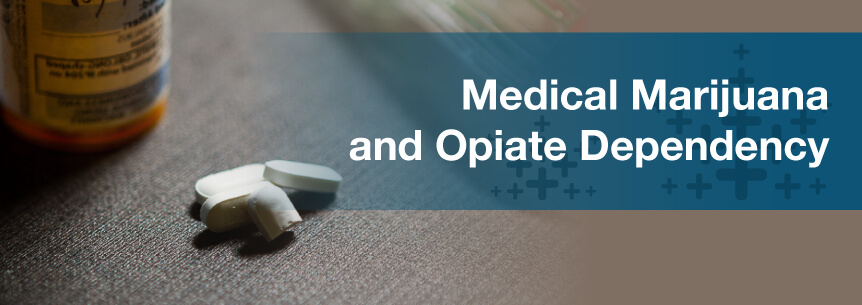
While a recent CNN report indicates the number of new cases of opiate addiction in the U.S. continues to climb, few people with an opiate dependence seek treatment. According to CNN, the number of people living with opiate dependency increased nearly 500 percent between the year 2010 and 2016. During the same six-year span of time, the number of individuals seeking medication-assisted treatment for opiate dependency increased by 65 percent.
The problem of opiate dependency is very real. And it’s a situation growing at an alarming rate, helping to give it its epidemic label. Fortunately, there are highly effective options available for treating addictions and dependencies of this type, including the option of medical marijuana for opiate dependence.
Opiate medications are both physically and psychologically addictive. Quite a few drugs fall within the description of opiates, including:
Many of the medications commonly prescribed to treat pain are opioid medications. While they’re highly effective at neutralizing the sensations of pain, they’re also highly addictive — and developing a dependence on these medications is far too easy. Some people go from painkiller to painkiller in hopes to find relief from their chronic pain.
Opioid dependence comes in many forms. Some people find themselves dependent upon opiates in the aftermath of an accident. Others develop it through illicit drug use and abuse. Regardless of the path, dependence on opiates may feel like it’s taking over your life. Either the pain or anxiety you experience is intolerable without the medication or you experience physical reactions if you go too long without taking more. In either situation, treatments and therapies are available to offer help and relief for your dependence on opiates.
The physical manifestations of an opiate dependence present themselves in different ways with each affected individual. There are, however, some fairly consistent side effects of opiate abuse. This fact is especially the case with opiate overdoses.
First, the symptoms of opiate use usually include at least a few of the following:
Other, less obvious signs of opiate abuse may involve your loved one seeming to take an excessively large amount of prescription medication. If you’ve noticed your medication missing, it could be another sign a loved one is abusing opiates.
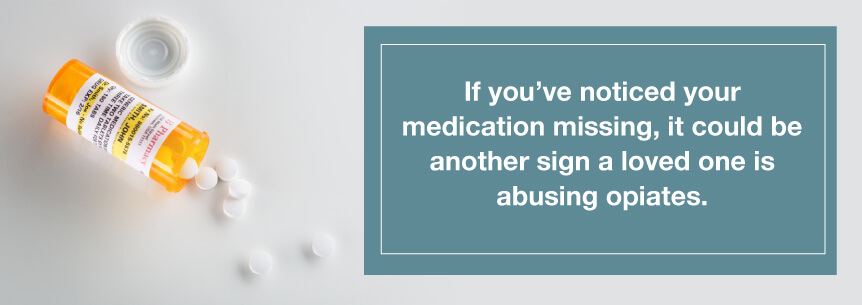
When a person transitions into a state of dependence or opiate abuse, overdose is an immediate concern. If you or someone you love experiences the following symptoms of an opiate overdose, the U.S. National Library of Medicine suggests you should call 911 right away:
While addiction to opiates is treatable, failing to seek treatment increases the risks of overdose, which can have fatal consequences.
Unfortunately, one of the most common causes of opiate dependence is prescription medications for pain. People who need narcotics to manage pain from a wide range of causes can grow dependent on the medication. This situation includes issues like:
Some people begin their path to addiction to opiates through illicit drug use with substances like heroin, opium, methadone and black market narcotic drugs. Ultimately, the cause of opioid addiction is the receptors in your brain creating artificial endorphins, which your brain begins to rely on to feel good.
These false endorphins can trick your body into stopping the production of its endorphins, in which case you need the medication or illicit drug to feel good. As this happens, your body develops a tolerance for the opiates and needs more of them to produce the same pleasing result.
Some of the most common types of opiate dependences stem from painkillers, heroin and methadone.
The instant effects of opiate dependence for many people are the euphoric feeling of pleasure and relaxation resulting from taking the drug. Some may refer to it as “mellow” while others compare it to a sense of inner peace. Regardless, the feelings of peace and contentment are short-lived.
Once the initial pleasure ends, most users experience a sense of restlessness and agitation along with a host of other unpleasant sensations. Some people experience symptoms and side effects of opioids, such as the following, when coming down from an opiate high:
And worse, the constant craving for more. The key is to remember that options for treatment — including cannabis for opiate dependence — and hope for overcoming opiate dependence exist.
The statistics related to opiate dependence are staggering and offer few silver linings. These are some of the numbers associated with opioid addiction in the U.S.:
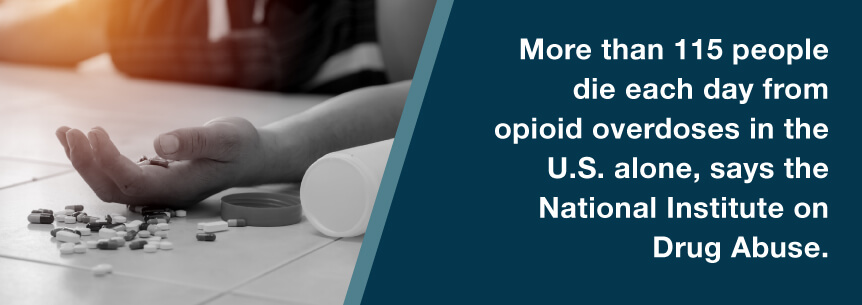
With these kinds of statistics, the promise of effective opiate dependence treatment is the sole silver lining, and it’s one worth clinging to if you or someone you love is struggling with this particular type of addiction.
The most effective treatments for opiate dependency involve a combination of medication and intensive therapy. In some cases, physicians need to administer medical treatments to address co-existing physical and mental health conditions. Common drugs used to treat opiate addictions include:
Some of these medications require patients to go through a complete detoxification cycle before administering, and all medications should be combined with behavioral counseling, according to the National Institute on Drug Abuse.
In the case of an opioid overdose, naloxone may be used to provide a rapid response to reverse the overdose. Naloxone is currently available in three forms:
Opiate dependency is nothing to be taken lightly. It can have devastating consequences for those who do not seek help. However, the prognosis is no longer as grim as it has been in the past thanks to wider availability of treatment programs and overdose-reversing treatments like Naloxone. What’s more, medical cannabis is showing promise for helping people overcome an opiate dependence.
There’s a relationship between opioids and marijuana. However, it’s not the gateway drug to opiate addiction many believe. The bulk of individuals using marijuana don’t progress onto “harder” substances, reports the National Institute on Drug Abuse. On the contrary, it’s a safer alternative to pain medication. Plus, some evidence even shows one of the primary components in cannabis, cannabidiol (CBD), helps stop the cravings consistent with opioid dependence.
According to some research, individuals turn to cannabis to relieve their pain, and when they do so, they avoid more harmful, addictive drugs. The research’s findings support the theory that some individuals will substitute weed for prescription drugs like opioids. And people have used weed for its painkilling effects for decades.
For individuals using opioids to alleviate painful conditions, taking them off these addictive medicines can impact their well-being and health. They can use medical cannabis together with opioids to lower their need for larger doses. Marijuana for opiate dependence can also help wean them off opioids while treating their symptoms at the same time.
Cannabis for opiate dependence works with your endocannabinoid system (ECS) and opioid system. Your ECS then interacts with various areas of your opioid system. On the other hand, prescription opioids don’t interact with your ECS as medical weed does. Cannabis compounds can:
Cannabis does similar things in your brain, like opioids do, such as blocking pain signals and causing you to feel good. But the cannabinoids in marijuana, like CBD, THC, CBN and CBC, also methodically work to relax damaged body tissue and reduce inflammation. And CBD has the potential to help with the chronic pain people with opiate addictions often experience.
Medical cannabis for opiate dependence is a safer option because it’s not physically addictive and doesn’t have any overdose death reports. You don’t build a tolerance to weed as you do with opioids.
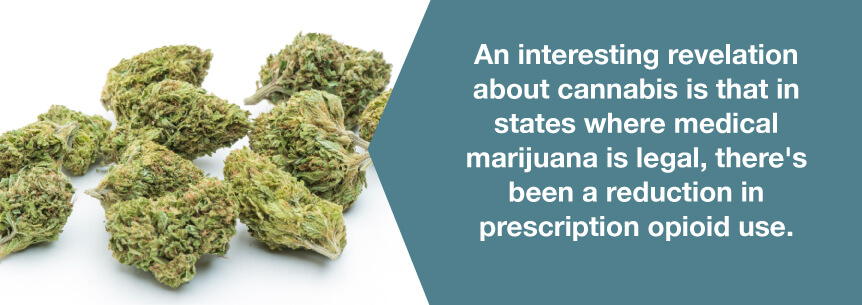
An interesting revelation about cannabis is that in states where medical marijuana is legal, there’s been a reduction in prescription opioid use. The research suggests individuals turn to marijuana to control their pain, and in doing so, avoid more dangerous and addictive prescription opioids.
Medical marijuana and opiate dependence treatment can help alleviate symptoms like:
Some cannabinoid compounds — those not having a psychoactive effect — can enable patients to reduce their pain without feeling “out of it.”
Allowing individuals to access marijuana and opiate dependence treatment legally seems to decrease reliance on addictive opioids. In fact, researchers found those states allowing cannabis use for medicinal purposes had around 2.11 million fewer opioid prescriptions under Medicare D each year than the states that haven’t legalized marijuana.
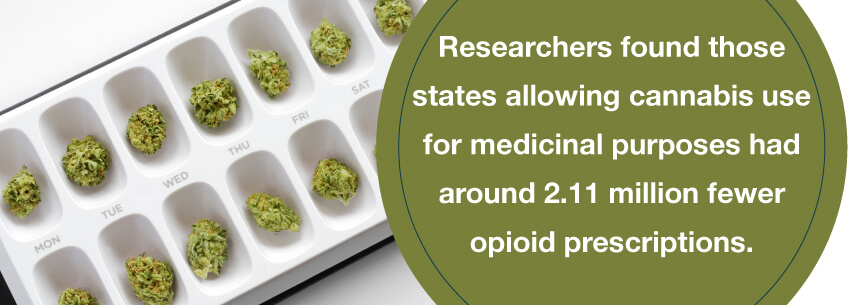
Because of the opioid epidemic and the potential for addiction and overdose of opiates, the hope is that the medical community and legislators will consider medical cannabis programs as a safe and effective tool to combat the issue plaguing America today.
To date, no FDA-approved painkiller derived from marijuana exists, but pharmaceutical companies have drugs in various developmental stages.
Some good medical marijuana for opiate dependence strains to try include:
Many other strains may be helpful for you to overcome your opioid dependence. Talk to the budtender at your dispensary to find a strain that best suits you.
Inhaling the vapor or smoke from a dried marijuana flower is the standard form of consuming cannabis. However, there are numerous other ways to smoke marijuana flower, including:
Edibles
Infusing cannabis into food is another favorite among cannabis users and has been for a while now. These days, dispensaries carry an array of edibles to choose from to suit the tastes of just about everyone. Some edible types include:
Sublingual
You take a few cannabis drops under your tongue.
Concentrates
Much stronger than regular cannabis, so start slow.
Transdermal
A cannabis-infused patch.
Topical
A cream, salve, balm or lotion you apply to the area that needs relief.
If you reside in one of the states that has legalized medical cannabis and are looking to try out this course of treatment, you first need to consult with a qualified medical cannabis doctor. MarijuanaDoctors.com is an extensive directory and one-stop shop for reading reviews, obtaining information and finding dispensaries and locations.
Search for a cannabis doctor for opiate dependence and book your appointment today at Marijuana Doctors to start your cannabis and opiate dependence treatment. Also, to stay on top of the latest cannabis information and news and receive discounts, sign up for our newsletter.
Find A Doctor Find A Dispensary